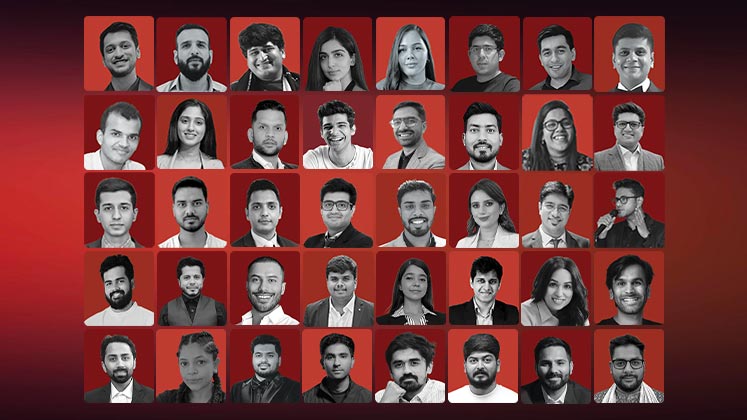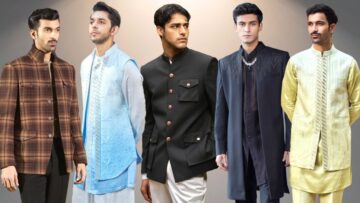You can really tell how healthy an industry is by how its young leaders are stepping up to change it. And if that’s the measure, then after meeting hundreds of inspiring professionals for the second edition of AO 40 Under 40, we can confidently say that the future of India’s fashion industry has never been more exciting or in more capable hands. This year, we received hundreds of nominations from all domains of fashion, be it retailers and manufacturers, to tech innovators and sustainability pioneers. The talent on display was incredible. Given the paucity of space, we could only feature a few, chosen carefully through a fair process by our Editorial Team that made sure each person truly stood for excellence, creativity and leadership. One thing that really stands out this year is the focus of these leaders on technology and sustainability, two fronts that are crucial for India to take its next big leap in fashion. They are using technology in design, production, sourcing, sales and other facets of the supply chain to make operations simpler, smarter and more efficient. They are also pushing sustainability to the forefront, making sure the industry grows responsibly and stays ahead of the curve.
Many of these leaders already have plans to grow their businesses, expand into new areas or further create their own success stories. It shows they are ambitious, confident and ready to shape their own path rather than wait for the industry to change around them. Their expansion plans show that they are upbeat about the future of the industry. Another aspect that is glaringly apparent is their mindset. None of them is content following the treaded path. They are eager to innovate, explore the uncharted territory and challenge what’s considered possible. They aren’t afraid to think big, take risks and set new benchmarks for what Indian fashion can achieve globally. These leaders also see leadership differently. For them, it’s not about power or giving orders from the top down. It’s about bringing people together, creating systems that work and opening up opportunities for everyone. Read on to discover their inspiring stories and how they’re shaping the future of Indian fashion!
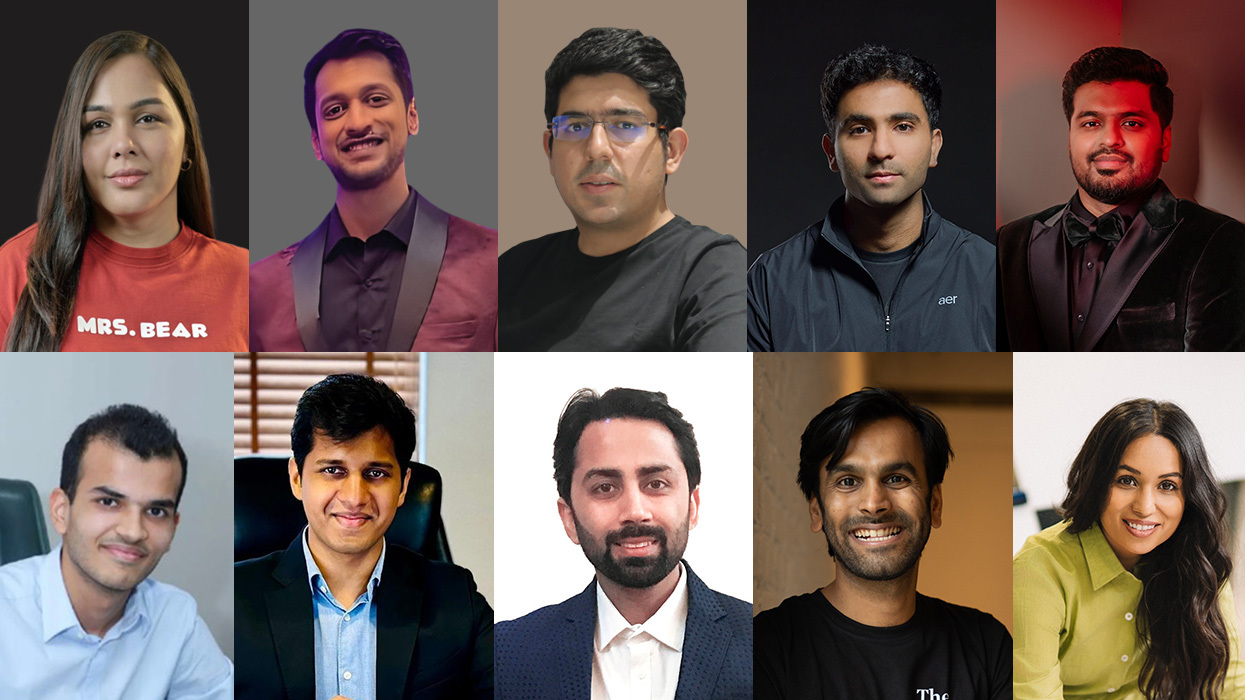
Style Builder
Tanvi Somaiya, Co-founder, The Bear House
Tanvi is a visionary entrepreneur who has artfully merged her passion for fashion with her expertise in clothing technology, crafting a distinctive brand identity for The Bear House. With an unwavering eye for detail and a profound understanding of the menswear market, Tanvi has driven the brand’s remarkable growth and success.
Her journey in fashion began at NIFT Mumbai, where she mastered design, styling and manufacturing. Experience with renowned international brands like Zara and Mango sharpened her skills, enabling her to spot opportunities and gaps in the market. In 2017, Tanvi co-founded The Bear House with her husband, Harsh Somaiya, envisioning the creation of premium quality smart casual shirts that embody elegance and sophistication. Under her creative leadership, the brand has transformed into a symbol of urban-luxe menswear, characterised by a harmonious fusion of minimalist details and maximalist design elements.
Tanvi’s leadership is defined by her relentless pursuit of innovation and excellence. She remains attuned to the latest trends and consumer preferences, actively visiting trade shows, exhibitions and factories to keep The Bear House.
Style Maverick
Sresht Agarwal, CEO, Dopplr
Established in 2020 by Sresht, Shubham Singh and Vishal Daga, Dopplr has emerged as a leader in pioneering virtual try-on technology. The startup’s platform enables online apparel brands to offer a genuine 3D fitting experience, allowing customers to create digital copies of themselves to see how clothes will fit and look on their own bodies.
A key feature of Dopplr’s technology is its ability to gather and analyse customer behaviour data. This insight helps brands make informed decisions and personalise the shopping experience to meet individual customer preferences. In 2024, the platform secured US $ 750,000 in funding. One of the biggest challenges for the company is the cost and accessibility of VTO technology, as the initial investment can be high for smaller businesses. Dopplr addresses this issue by offering a low-cost trial, allowing brands to test the solution and assess its ROI before committing financially. This includes digitising a limited set of garments, so brands can evaluate the ROI without overcommitting resources. Implementing the solution for a few base silhouettes over a couple of months helps determine the ROI through A/B tests. If the ROI is satisfactory, the solution is scaled up.
Wardrobe Leader
Sidhant Keshwani, Founder and CEO, Libas
Sidhant Keshwani took the reins of Libas as CEO back in 2013 and started the company with a turnover of Rs. 4 crore. Having earned a oneyear diploma from the Indian School of Business and Finance, an associate partner of the London School of Economics, Sidhant completed his Bachelor’s Degree in Economics from the University Of Manchester, England.
He always wanted to enter the e-commerce industry; hence, he introduced his family-owned business to the online space and Libas started retailing through its website, www.libas.in. Sidhant’s vision and leadership enabled a massive growth of 100% Y-O-Y, thereby resulting in a revenue of Rs. 600 crore in 8 years.
At Libas, he spearheads design, marketing, product and communication. He is also responsible for setting up sales and distribution, sourcing and manufacturing processes. Libas currently manufactures over one crore garments annually and works with vendors across Delhi, Jaipur and Surat.
The brand is now preparing for an IPO in the next 2-2.5 years, aiming to hit a revenue milestone of Rs. 1000 crore (US $ 114 million) along the way. Sidhant said the brand aims to maintain a gross margin of 55-60%, especially as it prepares for an IPO.
Activewear Innovator
Krish Sharma, Founder and Director, KRS Exports – Brand (Aeractive)
After graduating with honours from Northeastern University, Boston, with a double concentration in Supply Chain Management and Entrepreneurship, he returned to India with the goal of bringing his global learning back home. He joined his family’s 40-year old apparel manufacturing business to understand the operations from the ground up. For the next year-and-a-half, he spent his days on the factory floor, learning the nuances of production.
While manufacturing remained his foundation, he always knew he wanted to create something of his own — something that represented India’s potential to deliver world-class quality. With his passion for sports and background as an athlete, he found his purpose in building Aeractive, a high-quality Indian activewear brand designed for the modern Indian consumer. After months of research and development, they created four proprietary fabrics tailored for Indian weather and performance needs. When Aeractive launched in May 2025, the response surpassed expectations, with several products selling out within a couple of weeks. With the brand now onboarding onto Myntra and fast expanding its product range, this journey marks the beginning of a new era for Indian-made performancewear.
The Knitwear Strategist
Vishnu Prabu K S Joint MD, KM Knitwear Group of Companies
Vishnu is a second-generation member of a textile entrepreneurial family. He plays a strategic and operational leadership role in a vertically integrated textile export company, encompassing every stage from fibre to fashion. His leadership philosophy focuses on synergy—seamlessly connecting spinning, knitting, dyeing, finishing and garmenting units under one sustainable and digitally enabled ecosystem.
Under his guidance, KM Knitwear Group has become one of Tirupur’s most trusted and compliant export houses, holding world-class certifications. These credentials reflect his personal commitment to transparency, environmental responsibility and ethical production practices—values he believes are essential for the future of the apparel industry.
With a global outlook, he has successfully strengthened partnerships with leading international buyers, driving consistent business growth and positioning the group as a preferred sourcing destination. He focuses constantly on operational discipline and a people-first approach. He envisions taking KM Knitwear Group to the next phase of global expansion, anchored on sustainability, automation and design-driven manufacturing. His goal is to make the group a symbol of India’s textile excellence, where technology, craftsmanship and integrity work together to create enduring global impact.
The Expansionist
Hardik Jain Executive Director, T.T. Ltd
Stepping into a 70-year-old legacy business three years ago, he found himself at the intersection of heritage and transformation. Integrating into an established ecosystem demanded patience, adaptability and a modern vision. As a next-generation leader, he sought not just to continue tradition but to reimagine it. His focus quickly turned towards the domestic market, India’s vast and vibrant heartland, where he personally travelled across 100+ districts spanning Uttar Pradesh, Bihar, Madhya Pradesh and beyond, understanding the evolving pulse of rural consumers and local manufacturing capabilities.
Simultaneously, global exposure across China, the Philippines and the UAE helped him bridge traditional craftsmanship with international innovation. This dual perspective inspired him to introduce new-age production systems, design methodologies and sustainable initiatives, especially through recycled fabrics. By embedding recycling into operations, the company has not only improved cost efficiency but also contributed meaningfully to environmentally responsible fashion.
Today, the brand stands registered in over 60 countries, exporting finished garments to 5-7 new markets where Indian apparel presence was once minimal. This expansion is part of India’s larger US $ 40 billion export vision. In parallel, he has driven new-age branding and marketing approaches, including signing actor Rajkummar Rao as the brand ambassador, reshaping how legacy textile brands connect with younger audiences. Recognised across industry forums and publications, his journey reflects a singular ambition – to be a stalwart in India’s evolving textile landscape, blending sustainability, innovation and brand value into one seamless fabric of growth.
The Champion of Recycled Yarn
Kushagra Bansal, MD, KS SPINNING MILLS Pvt. Ltd.
Kushagra is a key figure in India’s sustainable textile revolution, leading one of the country’s fastest growing recycled yarn companies. His journey into textiles was completely unplanned. During Covid, he was studying architecture in the United States when the pandemic changed everything. He returned home to Panipat, India’s textile hub, where his path took a new direction. With no prior experience in textiles, he began exploring the industry and soon recognised both a challenge and an opportunity: India’s growing textile waste problem and the rising global demand for sustainable materials.
Driven by the vision to bridge this gap, he founded KS Spinning Mills in 2022. The company started by recycling post-industrial textile waste into high-performance recycled cotton yarns. What began as a small, purpose-driven initiative has grown into a global player supplying sustainable materials to fashion and home textile brands worldwide. Today, his focus is on creating a fully circular ecosystem—from recycled fibre to finished fabric, and eventually garments—making sustainability scalable and commercially impactful. Under his leadership, recycled yarn now rivals virgin yarn in quality and performance, setting new industry benchmarks. Looking ahead, he aims to build a fully circular textile ecosystem— where waste is completely eliminated and sustainability drives every decision. He aspires to expand KS Spinning Mills globally, setting new standards for eco-friendly yarns.
The Just-in-Time Manufacturing Master
Nitin Kapoor, CEO and Co-founder, IBA Crafts Pvt. Ltd.
Nitin Kapoor, Co-founder and CEO of IBA Crafts (brand: Moomaya), learned early in his career that growing sales without redesigning operations creates waste. At IBA, he and his team rebuilt how garments are made so that they don’t produce what won’t be worn.
The company runs Just-in-Time manufacturing from greige: they keep undyed base fabric and make garments only after the order. The flow is disciplined—post-order colour/print/dye or embroidery, auto-nest and cut in approximately 60 seconds, appguided stitching with live QC, then pack and ship in around 48 hours. Under the hood, IBA maintains consistent shade and hand across 60–70 materials using fabric “recipes” and ICC colour management and every order carries end-to-end traceability. Their design backbone consists of 20,000+ in-house designs, enabling high variety without pre-stock.
The impact of this model is significant: on lines running this system, unsold production is down by approximately 30-40% versus forecast-led methods, and redundant dye/finish runs have been reduced—an approach that saved an estimated 10.2 million litres of water in 2024. The company has shipped over one million products to 40+ countries, operates at roughly 2,500 units per day and consistently targets a 48-hour factory dispatch. Customers benefit from fresher assortments and true size and colour availability, while the business avoids overstock and markdown cycles.
IBA also empowers home-based tailor partners—many of them women—to work flexibly with transparent piece tracking and fair-pay templates, facilitated through their app.
Looking ahead, IBA focuses on two clear verticals: B2C, with a House-of-Brands strategy that brings on-demand, low-waste fashion directly to consumers, and B2B, offering JIT-asa-Platform for global brands to launch and replenish without pre-stock, supported by microhubs near demand and independently verified per-order impact (water, energy, chemicals, CO₂). Their purpose is simple: make after the order, measure honestly and scale a cleaner, faster, fairer way to produce fashion from India to the world.
The Pants Craftsman
Udit Toshniwal, Founder and Creative Director, The Pant Project
Born into a family with over four decades of textile expertise, Udit grew up surrounded by fabrics and craftsmanship. After studying Architecture and Industrial Design at The School of the Art Institute of Chicago, he returned to India with a mission to create a brand that marries global design thinking with Indian tailoring excellence.
Founded in 2020 by Udit and his brother Dhruv, The Pant Project has evolved from an online made-to-measure business into a full-scale omnichannel brand. Today, it operates 15+ stores across major cities, serves over 250,000 customers and has achieved an annual run rate of 80 crore. Udit’s leadership blends creativity with commercial discipline. He has led product innovation with category-defining styles such as Power Stretch Pants and Korean Pintuck Trousers, while building a strong brand identity rooted in fit, craftsmanship and storytelling. His ability to integrate design, digital growth and retail experience has positioned The Pant Project as a benchmark for modern Indian apparel.
Looking ahead, Udit aims to scale the brand to Rs. 800 crore while expanding into womenswear and global markets. His goal is to build India’s first homegrown lifestyle house of brands that competes on the world stage for quality, design and cultural relevance.
The Builder of Sustainable Materials
Shikha Shah, CEO and Founder, AltMat
Shikha Shah grew up in a family that recycled automobile waste into metals, witnessing the balance between profit and purpose at an early age. Her journey across NGOs, MNCs and start-ups across continents strengthened her belief that impact and profitability can coexist when innovation is rooted in systems thinking.
Two early projects on textile mass customisation and industrial agriculture sparked her interest in how materials are made and wasted. For someone who loved both fashion and the planet, the only way forward was to redesign the system itself. She discovered that agricultural residue, rich in cellulose, could be transformed into a regenerative, natural fibre that replaces textile crops without competing for land or water. This idea became AltMat, founded in December 2019 after two years of lab research.
Today, AltMat operates a first-of-its-kind factory in Ahmedabad, India, producing Altag®, a next-generation natural fibre made from agricultural residue of food and medicinal crops. Altag uses 99% less water than cotton, requires no farmland or pesticides, and helps improve land productivity by utilising crop residue that would otherwise be burned. By purchasing this residue directly from farmers, AltMat also creates new income streams and supports rural circular economies.
With investments from Rainmatter by Zerodha, H&M Group, Turbostart and Fashion for Good, Shikha is now scaling AltMat’s work with farmers, advancing R&D and pushing the boundaries to make next-gen materials part of today, for a better tomorrow.
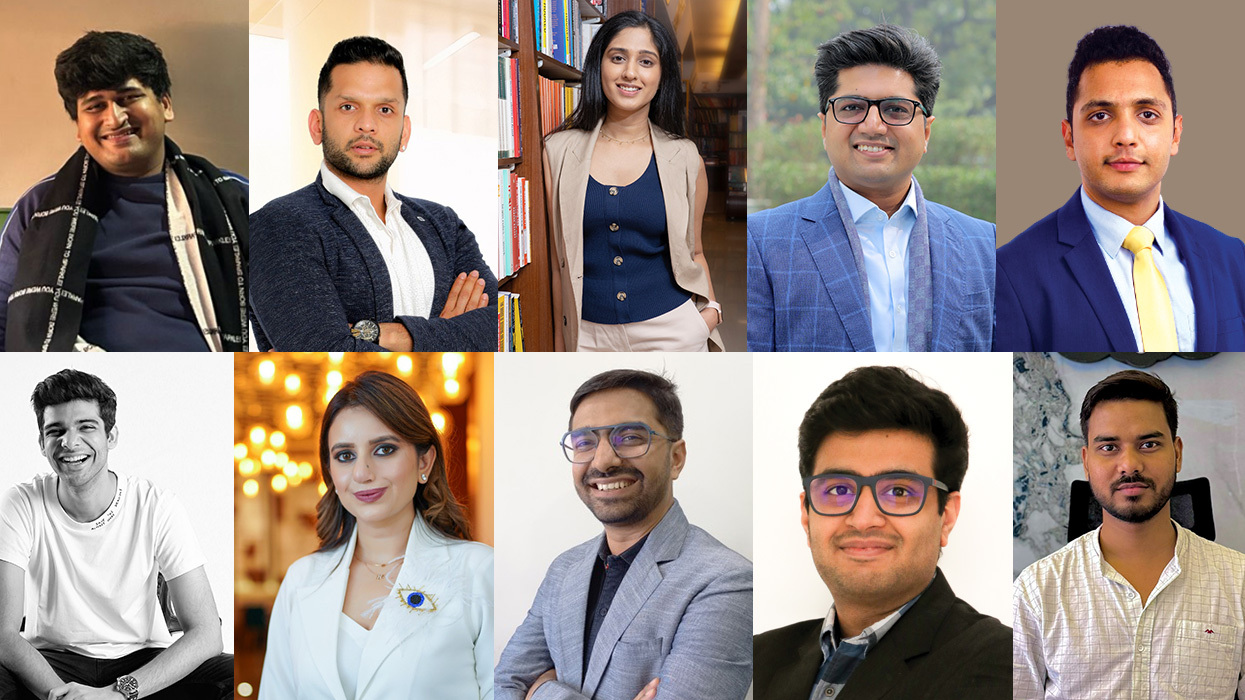
The Designer of Heritage Style
Shashank Vikash Pacheriwal, Director, Parvati Fabrics Ltd.
Shashank Vikash began his professional journey unexpectedly during the global pandemic in 2020. As a firstyear business student at SP Jain, Singapore, he returned home to Surat, India’s textile hub, when the world went into lockdown. What could have been a pause in his academic life became the starting point of his entrepreneurial journey. He began by manufacturing cloth masks, an initiative that not only addressed a pressing need at the time but also sparked his passion for textiles, design and innovation. Over the past five years, he has worked across every aspect of Parvati Fabrics Ltd., his family business, from weaving and production to design innovation, digital branding, and market expansion, eventually taking on the role of Director.
One of his key achievements has been helping revitalize Parvati Fabrics’ creative and operational direction, making it more adaptive to modern consumer preferences while preserving its traditional strengths. He led the introduction of new-age fabric innovations, design-led collections and a stronger digital presence that expanded the brand’s visibility among younger audiences. Through these efforts, the company has successfully balanced its deep-rooted legacy with the expectations of a global and tech-savvy market.
His goal has always been to bridge the gap between tradition and technology in Indian textiles. By infusing contemporary design sensibilities into traditional ethnicwear and exploring modern marketing platforms, he has contributed to positioning Parvati Fabrics as a forward-thinking, design-driven textile brand.
Looking ahead, his aspiration is to make Indian textiles a truly global phenomenon, celebrated for both their artistry and innovation. He aims to further integrate sustainable practices, technological advancement and global collaborations into operations, ensuring that the rich heritage of Indian craftsmanship continues to evolve with modern trends.
The Driver of Value Retail
Akash Agarwal, Director and CEO, V2 Retail Ltd.
At just 33, Akash Agarwal has already spent over 13 years redefining India’s value fashion landscape. As Director and CEO of V2 Retail Ltd., he represents a new generation of leaders who blend business intuition with innovation and empathy — united by a simple belief that fashion should be accessible to every Indian, everywhere.
Starting his journey as a management trainee, Akash immersed himself in every facet of the business — from finance and planning to merchandising and e-commerce — before leading V2 into a new era of transformation. Under his leadership, V2 has evolved from a traditional value retailer into one of India’s fastest-growing fashion chains, with over 260 stores across 197 cities, and is on its way to becoming a truly national brand with a presence in every state.
Akash spearheaded a product-led and digital overhaul across the organisation, implementing PLM, vendor SRM and AI-based planning systems that reduced design-to-market time from five months to four, cut old inventory from 18% to below 5% and achieved 90% fullprice sell-throughs — a rare feat in value retail.
He has also fostered a data-first culture, tracking 42 product attributes to measure gross profit per square foot — enabling V2 to optimize space, assortment, and profitability with precision.
With a consistent 55% markup — among the lowest in the industry — V2 delivers brand-quality fashion at prices the masses can afford. Akash’s vision is to make V2 one of the world’s most admired value fashion companies, transforming how India — and soon the world — experiences affordable style.
The Trailblazer in Medical Apparel
Vanshika Kaji, Co-founder of Knya
Coming from a family with a four generation textile legacy, Vanshika chose to carry forward this heritage in a modern way. During the pandemic, she identified a US $ 500 million unstructured medical apparel market in India that had long been overlooked. Doctors and healthcare professionals were forced to wear uniforms that were poorly designed, uncomfortable and lacking durability. To solve this, Vanshika, along with her Co-founder Abhijeet Kaji, launched Knya in 2020, creating scrubs that are high-performance, sustainable and stylish.
In just four years, Knya has empowered over 500,000 healthcare professionals across more than 1,000 hospitals in India, achieved 150% year-on-year revenue growth in FY ’24 rising from Rs. 12 crore in FY ’23 to Rs. 32 crore in FY ’24 with projections to reach Rs. 80 crore in FY ’25 and expanded beyond D2C into quick commerce platforms such as Blinkit, Swiggy Instamart and Zepto, with offline expansion into 10 retail stores underway. She introduced EcoFlex™ fabric, made from 100% recycled polyester, launched India’s first women’s medical hijab in 2023 to ensure inclusivity, built a decentralised supply chain with 15 upgraded factories and over 80 suppliers creating 600+ jobs with a 40% women workforce.
The Master of Threads
Ankit Jain, MD, Neelam Thread Pvt. Ltd.
Carrying forward a proud 45-year legacy built by his father, Late Shri Satender Kumar Jain, he represents the second generation at Neelam Thread Pvt. Ltd., one of India’s oldest and most trusted embroidery thread manufacturers since 1979. As the current face of the company, he has been instrumental in driving innovation, modernising operations and expanding the Telephone brand’s presence across domestic and international markets.
Under his leadership, Telephone Thread has become a preferred partner for luxury fashion houses, apparel exporters and renowned designers. With a strong commitment to sustainability, he has initiated efforts in recycled and eco-friendly threads and introduced FSC-certified viscose embroidery threads, ensuring responsible sourcing and environmentally conscious production. He has also led the launch of spun polyester embroidery threads under the brand name ‘Worldwide’ to cater to the evolving needs of apparel exports demanding matte-finish embroidery.
Looking ahead, his vision is to make Telephone Threads a globally recognized name synonymous with quality, creativity and sustainability, inspiring trust and excellence for generations to come.
The Workwear Wizard
Rohit Mall, AVP, Mallcom India Ltd.
Rohit works across domains like international markets, product development, branding and marketing strategy and driving digitisation.
He holds a bachelor’s degree in commerce from St Xaviers College, Kolkata. He is a qualified Chartered Accountant from ICAI and has an MBA degree from IESE Business School, Barcelona, Spain. With a financial acumen and an international exposure, Rohit has shaped his outlook to bring rigour in business strategy and implement global best practices.
Under his guidance, Mallcom introduced new helmet moulds and started exporting them globally. Further, he was instrumental in expanding the footwear business globally by investing in newer designs and establishing a design studio with the help of a grant secured by DPITT from GOI. Moreover, Rohit has helped the organisation increase its range of synthetic gloves and workwear by addition of 21 gauge and 18 gauge NBR gloves with high cut resistance and hi-visibility vests and rainwear.
Rohit was instrumental in Mallcom penetrating newer geographies such as Australia, Russia, Africa and increasing its market share in other geographies such as USA, Australia and Europe. With his effort, Mallcom achieved its highest ever quarterly and annual consolidated turnover in Q4 and fiscal year FY ’24-25. He worked with the leadership team to launch and evangelise the core values of Mallcom – COIN (Commitment, Ownership and Integrity). These values drive the company culture top-down and ensure that they are embedded in the day-to-day operations. Rohit is also committed to integrating sustainability, driving workplace inclusion and having the company prepare a strong management team.
The Fashion Disruptor
Dhruv Khurana, Founder and Creative Director, Almost Gods
Dhruv is the Founder and Creative Director of Almost Gods, a defining voice in India’s contemporary design and fashion landscape.
Founded as an independent label, Almost Gods stands among the first Indian brands to approach fashion through a cultural lens—positioning clothing not merely as product, but as a medium for community, dialogue and cultural expression.
The brand currently operates three experiential retail spaces across India—Delhi (Dhan Mill), Gurugram (32nd Avenue) and Mumbai (Bandra). Each location functions as more than a store; they serve as cultural destinations that host art installations and collaborative events, including a partnership with the India Art Fair.
Building on this success, Almost Gods is set to open its fourth flagship in Hyderabad, further strengthening its national presence and positioning within India’s premium design ecosystem.
Almost Gods has led several firsts for Indian fashion, including high-profile global collaborations with G-SHOCK and FILA, marking a new era of international engagement for South Asian labels.
Its growing cultural resonance is reflected in a diverse, high-profile clientele. Almost Gods pieces have been worn by global and Indian icons alike, including Machine Gun Kelly, Dani Leigh, Ranveer Singh, Diljit Dosanjh, Alia Bhatt and others—cementing its position at the intersection of global fashion and Indian creativity.
The Future-Ready Fashionist
Kalika Mehra, Director, Active Clothing Co. Ltd.
Kalika, a Fashion Design graduate from NIFT, joined her family business, Active, in 2014 and has since driven its transformation into one of India’s largest sweater manufacturers. Her journey blends creativity with strategy, leading design innovation, operations and compliance to build a globally trusted company. From conceptualizing collections to partnering with international clients, she has been deeply involved in every stage of growth. With a focus on leadership, empowerment and sustainable manufacturing, Kalika is passionate about shaping a forwardthinking apparel industry that celebrates quality, innovation and responsibility.
Under her leadership, Active has earned recognition from leading global brands for its consistent quality, reliability, and innovation. As a true “sketch-to-store” company, Active offers complete end-to-end solutions—from design and product development to manufacturing, logistics, marketing, and retail management—all under one roof. This integrated model has established Active as a trusted partner for global apparel brands, redefining efficiency and excellence in India’s fashion manufacturing landscape.
Kalika has also pioneered 3D and metaverse-based design solutions, transforming how brands develop products by enabling faster, smarter and more sustainable creation. Leading this digital shift, she has reduced sampling and waste while empowering customers to innovate confidently. This integration of technology and creativity is shaping the future of sustainable apparel manufacturing.
Looking ahead, Kalika envisions a future where technology drives fashion. By 2030, she aims to transform Active into a fully smart knit factory, integrating advanced seamless garment technology to enhance precision, efficiency, and sustainability while reducing manpower dependency. Her goal is to grow the company to Rs. 1,000 crore, powered by innovation and responsible manufacturing. As Active embraces digital transformation, Kalika remains focused on creating value for partners and consumers alike—building a future where technology, creativity, and sustainability coexist to redefine excellence in the apparel industry.
The Tech Transformer
Karan Patel, Founder, Nuvate Technology Pvt. Ltd.
Karan represents the new generation of leaders driving digital transformation in India’s apparel and textile industry. At just 31, he is pioneering software solutions that are simple to use, easy to implement and designed to solve real factory challenges with measurable results.
In the last five years, Karan and his team have developed four groundbreaking software systems reshaping the textile ecosystem: StitchIT, a Cut-to-Pack ERP that streamlines production, monitors line performance and provides real-time efficiency insights; WashIT, a smart automation tool for washing units that enhances process traceability, ensures cost control and promotes significant water savings through optimized washing cycles; HR-Tech, a workforce management system designed for labour-intensive industries, simplifying attendance, payroll and compliance with a worker-friendly interface. Lastly, Digitail is a next-generation WMS, OMS and retail management software connecting warehouses, stores and e-commerce platforms seamlessly.
These innovations have already automated over 60 garment manufacturing plants across India, resulting in up to 30% improvement in efficiency, reduced wastage, millions of liters of water saved.
The Eco-Innovator
Vimarsh Verma, Director of Operations, SEDL
Since joining the company in 2020, he has spearheaded large-scale projects across pharmaceuticals, FMCG and chemical industries, delivering over 100 successful installations including Zero Liquid Discharge (ZLD) systems for leading clients such as Sun Pharma, Dr. Reddy’s, Cipla, Coca-Cola and Tata.
An engineer by training and a strategist by vision, Vimarsh has rapidly advanced within SEDL, moving from product development to heading the Water Division, where he scaled turnover from Rs. 50 crore to Rs. 150 crore in just three years, before being elevated to his current role in 2025. His expertise spans thermal process design, product commercialisation, project management and technical-commercial sales.
Vimarsh holds a B.S. in Mechanical Engineering from the University of Colorado, Boulder and an M.S. in Mechanical Engineering from the University of California, where he was a consistent Dean’s List scholar and a recipient of multiple academic awards.
Recognised as a young sustainability leader, he has received the IFAT India Award and the Watman International Conference Award, and his research on low-temperature evaporation for distillery wastewater has been published internationally.
Beyond his corporate role, Vimarsh actively champions CSR initiatives in education, environment, employee welfare and women’s empowerment.
The Artisanal Advocate
Sanaullah Siddiqui, Founder and CEO, Poshak Chikan Studio
Poshak Chikan Studio is a Lucknow based fashion brand dedicated to preserving and promoting the centuries-old art of authentic handcrafted Chikankari. After gaining two years of experience at a renowned Lucknowi Chikankari manufacturing company, he founded Poshak in 2020 with a mission to protect the traditional craft from being overshadowed by machine-made imitations marketed as “handmade.” Recognizing how mass production threatened both the authenticity of the art and the livelihoods of artisans, Sanaullah built a brand rooted in craftsmanship, purpose, and integrity.
Under his leadership, Poshak Chikan Studio has grown from a small room-based set-up into one of India’s most loved handcrafted apparel brands, completing five successful years in July 2025. The brand has shipped over 50,000 handmade pieces worldwide, cultivated an organic Instagram community of over 350K followers and empowered hundreds of local artisans and craftswomen through sustainable livelihood opportunities.
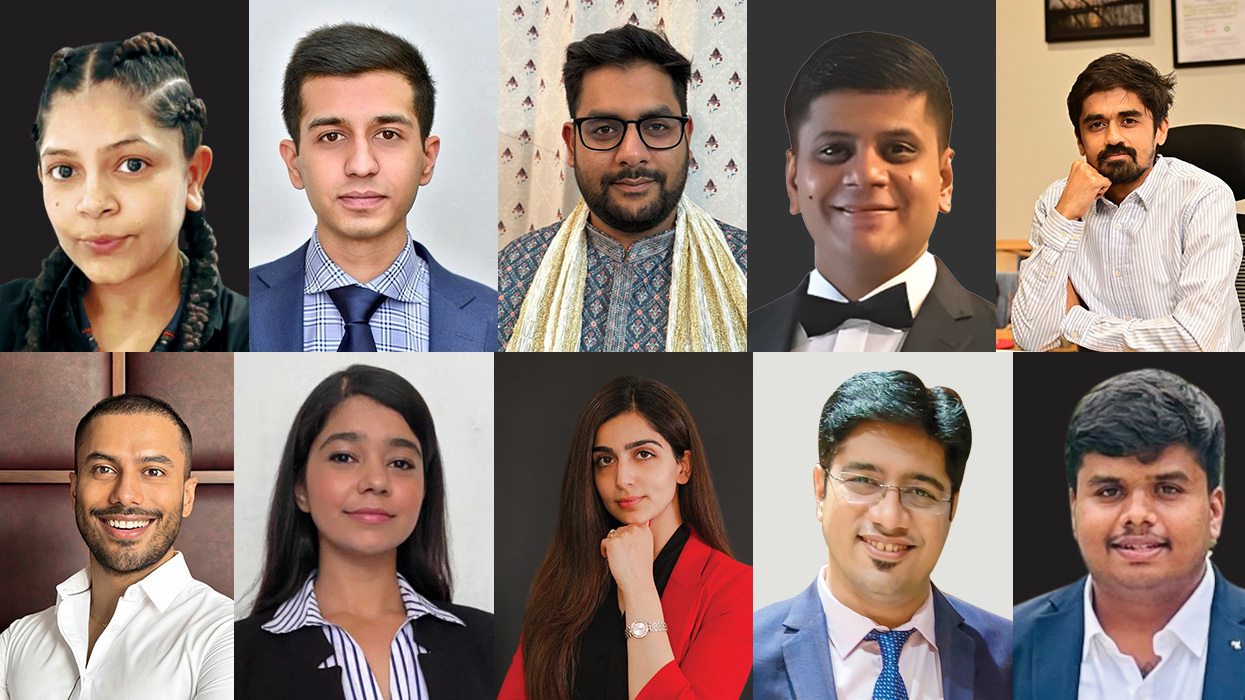
Earth’s Storyteller
Charmee Ambavat, Founder and Creative Director, The Terra Tribe
Charmee Ambavat is a finance professional who studied chartered accountancy and worked in banking and investment for three years, but she wasn’t very driven by the kind of work she was doing. She went on to study design at NIFT, as she had always been creatively inclined. That’s how her fashion design journey began.
During her time at NIFT, she became deeply intrigued by sustainability and the human footprint on the world. Charmee is deeply inspired by nature, indigenous cultures and tribes around the world. She describes herself as a nomadic tribal soul living in a city, and her designs reflect this.
The name The Terra Tribe has significant meaning. Terra means earth or soil in Latin, while tribe represents a community of people trying to protect the planet and reflects the intrinsic nature of the brand’s collections.
Charmee acknowledges the challenges of designing sustainable collections, such as finding non-toxic dyes, utilising all waste generated in the process and still delivering value to customers.
Her design process is highly intuitive. While traveling, she draws inspiration from the surroundings, local culture, art, and architecture, which translate into prints, embroidery, and silhouettes.
For example, the inspiration behind the Reborn collection came from an autumn/fall trip to northern Japan, which Charmee describes as magical. For this collection, one tonne of waste was processed and used to create handmade textiles that form the base of the collection. The brand also hopes to process waste collected by other brands in the future and is already working in this direction.
The campaign for Reborn aimed to highlight the raw nature of the collection and was shot with the Brahmaputra River as a backdrop. Looking ahead, Charmee’s goal is for The Terra Tribe to eventually become a carbon-neutral brand.
The Digital Craftsman
Viren Aggarwal, Director, Fine Line
Viren Aggarwal is a forward-thinking professional passionate about driving sustainable progress, consistently focusing on delivering measurable impact through digital transformation, operational optimization, and environmental responsibility.
At Fine Line, one of his key achievements has been leading the digital transformation of core operations. By implementing ERP systems, digitizing production workflows, and leveraging real-time data analytics, he significantly improved efficiency, reduced lead times, and enhanced supply chain transparency. This shift not only streamlined processes but also empowered teams to work smarter and collaborate more effectively.
His commitment to sustainability and waste control has delivered both environmental and business results. He introduced smart production practices, reduced fabric wastage by over 20%, and launched recycling programs for end pieces and packaging materials. These initiatives aligned Fine Line’s operations with global sustainability standards and strengthened its position as a responsible, ethical manufacturer. Through continuous optimization efforts, Viren identified key bottlenecks in production and implemented lean manufacturing principles, resulting in improved resource utilization, increased energy efficiency, and higher overall productivity. These outcomes have kept Fine Line competitive while meaningfully reducing its environmental footprint. What defines Viren as a next-generation leader is his ability to blend tradition with innovation—honoring the craftsmanship at the heart of garment manufacturing while embracing digital tools and sustainable practices that will define its future.
The Supply Chain Visionary
Aaryan Singla, MD, FAITH by Fashion Images Overseas
Aaryan Singla has always been drawn to solving complex problems— whether in engineering, operations or business. That drive has taken him from building Airbus A320 wing components in Belgium to working on subsea oilfield systems at Schlumberger’s Cameron Division in Houston. Along the way, he helped develop automated packaging lines for global FMCG brands, published research on novel soft robotics at Georgia Tech, and taught mechanical engineering as a university teaching assistant. He graduated Summa Cum Laude in Mechanical Engineering with a specialisation in AI and Robotics.
Returning to India, he focused on modernising his family-run export house, Fashion Images Overseas, using the skills he had acquired—introducing Lean Six Sigma, digital systems, and sustainability initiatives. This journey led to the creation of FAITH (Follow-up Assurance & International Trading Hub), a platform designed to help global buyers execute better in India. FAITH was born when leading Japanese buyers consistently faced production delays and follow-up breakdowns with Indian suppliers. Instead of shifting orders elsewhere, Aaryan built a transparent and accountable execution system. Today, FAITH handles millions of garments annually, managing complete follow-up from fabric sourcing and sampling to delivery of finished garments.
The platform has already brought millions of dollars in new garment business to India—not just by solving problems but by shifting orders from Bangladesh, Myanmar, Cambodia, and China. FAITH’s International Trading division empowers Indian mills, yarn suppliers, and local artisans by connecting them to global buyers, while also bringing Japanese fabrics and home goods to India.
Aaryan’s vision is to scale FAITH across the Southeast Asian region, powered by technology, sustainability, and trust—and to help position India as the world’s most reliable and future-ready apparel export partner.
The MOQs Maverick
Nissin Shah, Partner, Stitchman Inc.
After completing a BBA in Finance and International Business at the Zicklin School of Business, CUNY, and gaining experience as a research analyst in an investment firm, Nissin joined Stitchman in 2010. Recognizing significant market opportunities through international trade shows, he established a US office in 2017 to better serve the promotional and wholesale industry with lower minimum order quantities (MOQs) and faster turnaround times. This strategic move rapidly expanded the customer base and ensured a steady workflow for the factory. The success of this model led to its replication in the UK, Australia and the Middle East. The company now exports products to about seven different countries. Its customer-focused approach has earned a 5-star rating in the US promotional industry since 2018.
The company maintains a turnaround time (TAT) above 95%, significantly surpassing the industry average. His primary goal is to drive the geographic expansion of business while transforming the company from a traditional manufacturing operation into a technology-driven enterprise. He aims to achieve this by actively implementing innovative technologies in both manufacturing and marketing processes. In addition, he is focused on forging strategic alliances that allow investment in other businesses and diversification of product offerings—including expanding into categories such as lanyards, headwear and uniforms.
The Eco-Fabric Innovator
Kunal Balar, Co-founder, Herbal Fab
For generations, the production of cotton textiles has caused irreparable damage to the environment. As brothers, engineers, kins to textile entrepreneurs, and admirers of nature, Prashant and Kunal decided to make organic textiles attainable to the world and thus Herbal Fab was born.
They believe that a majority of the organic clothes and textiles business comprises designers, small-scale brands and start-ups who want to contribute towards sustainability but are limited by high MOQs and other supply chain difficulties. Herbal Fab aims to reach as many such individuals and companies as possible, meet their fabric and clothing needs.
They strive to be a one-stop shop for all kinds of sustainable textiles, covering organic cotton, Lenzing fibres, linen, hemp, cupro, peace silk and recycled fabrics. Their sewing factory is GOTS certified and SEDEX audited, where they aim to create a friendly and happy environment for all.
The Apparel Innovation Architect
Arpit Aryan Gupta, Partner/New Business Development Head, NG Apparels
Coming from a family with deep roots in textile industry and entrepreneurship, Arpit expanded NG Apparels with a simple vision: to make India’s apparel manufacturing smarter, faster and more transparent for global brands. Over the years, he has transformed the company from a traditional export house into a modern, system-driven organisation that caters to premium clients across the Europe, Australasia and GCC and North America.
With international exposure through his education in Australia and the UK, Arpit brings a global business mindset to the manufacturing table. Under his leadership, NG Apparels has achieved over 240%+ growth in capacity, built a reputation for consistent quality and established a strong client retention rate through trust and innovation. He has introduced digital tracking systems, lean manufacturing practices and a seamless client experience model that provides real-time visibility into every production stage. His larger goal is to position NG Apparels as India’s most trusted turnkey apparel partner offering everything from design and sampling to production and logistics under one transparent ecosystem.
Sneaker Maven
Reba Singh, Co-founder, Off Limits
Founded by siblings Reba Singh Prem and Raunaq Singh Prem, both alumni of the Indian School of Business, Off Limits is redefining the accessible highperformance fitness and athleisure space in India. The brand is launched by Gurukirpa Lifestyle Company, one of India’s largest sportswear manufacturers and exporters, which produces around 2 million apparel items and 1 million pairs of shoes annually.
As frontrunners of design, Off Limits offers a catalogue of 500+ styles across running, training, athleisure and lifestyle categories. Designed in-house by creative minds from NIFT and FDDI, its products strike a fine balance between innovation, comfort and individuality — blending global aesthetics with Indian needs and empowering selfexpression through style and performance.
The brand is also a proud pioneer of India’s only Big & Tall footwear range (UK sizes 12–15) — crafted using exclusive lasts and moulds to ensure comfort and proportion for larger feet. This segment, long ignored by the market, finally has access to fashion-forward, performancedriven footwear. Through its flagship Steps to Smiles initiative, Off Limits partners with the Blind Relief Association in Delhi to bring people with blindness into the mainstream workforce.
The Activewear Queen
Tejasvi Madan, Founder, BeyondBound (Ermächtigen Clothing Gym LLP)
She began her career in investment banking at Goldman Sachs, where she learned the value of precision, discipline and data-driven decision-making. But deep down, she wanted to build something that combined purpose with passion, something that empowered women beyond numbers and spreadsheets. That’s how BeyondBound was born, an activewear brand designed to empower women to move, live and lead without boundaries.
At BeyondBound, the focus is on versatility, functionality and inclusivity. Every piece is crafted to help women transition seamlessly through their day — from gym to street, from movement to stillness — without compromising on comfort or confidence. The products feature sweat-wicking, anti-odour technology and high-density logos built for durability and long-term wear. The brand takes pride in being truly inclusive, ensuring that no higher price is charged for larger sizes.
What makes BeyondBound special is its vision to bridge the gap between traditional and modern expressions of movement, whether it’s wearing leggings for Kathak or a jumpsuit for strength training. The brand demonstrates that women can do anything, in anything. F Looking ahead, the founder aims to take BeyondBound to a global stage.
The Retail Enabler
Abhishek Dua Co-founder, Showroom B2B
When Showroom B2B was founded in 2020, the vision was clear: to bring order and transparency to India’s unorganised apparel supply chain. After years of witnessing how small retailers struggled to source the right products at fair prices, Abhishek, along with Co-founder Shubham, set out to build a bridge that directly connected manufacturers with retailers, removing inefficiencies and enabling scale.
In the early days, they focused on deeply understanding pain points across the ecosystem. Manufacturers struggled with fragmented distribution, while retailers faced limited assortment and access to capital. The solution lay in a hybrid approach combining the trust of touch-and-feel buying with the speed and reach of digital commerce. This led to the creation of their phygital model, with experience centres that allow retailers to browse in person, supported by a seamless ordering app.
In just three years, Showroom B2B has scaled to serve over 7,000 retailers and several large format clients, including Reliance Retail, Shoppers Stop and Triburg. During this period, the company achieved 30 times revenue growth and raised US $ 6.5 million in funding, led by Jungle Ventures. A sharp focus on denim and ethnic wear has helped build a strong position in the value fashion segment, powered by a 250-member team spanning sourcing, design, and technology.
Before starting Showroom B2B, the founder co-founded a profitable B2B manufacturing venture that grew to Rs. 100 crore in topline revenue. That journey instilled the importance of operational discipline and customer-focused thinking, principles that continue to guide everything at Showroom B2B. Looking ahead, the vision is to establish Showroom B2B as India’s most trusted B2B sourcing and design-to-delivery platform for value fashion, helping retailers and brands access trend-led, high-quality products faster and more cost-effectively.
The Conscious-Driven Leader
Arvind M, Director, The Global Inc. (India)
Arvind M began his professional journey in 2015 in the hospitality and travel technology sector, where he cultivated a passion for innovation, exploration and meaningful human connection. Travelling, meeting people and understanding diverse perspectives taught him how ideas can transform industries.
His deeper purpose, however, was rooted in his heritage—the textile world. From his great grandfather, a yarn merchant, to his father, a weaver pioneering auto-loom technology, he inherited a legacy of craftsmanship and resilience. He sought to continue that legacy by adding innovation and sustainability to it.
When he joined The Global Inc. (India), he discovered his true calling: to merge creativity with environmental responsibility. He envisioned developing sustainable printing inks that empower artistic freedom while protecting the planet. Every formulation produced is MRSL-compliant, non-toxic and eco-conscious. For Arvind, sustainability is not a trend— it is a lifelong commitment.
As Director, he has ensured the company’s green values extend beyond manufacturing, from achieving zero food waste in the canteen to ensuring workplace safety and transitioning to electric delivery vehicles. He is driving The Global to become a diversified chemical conglomerate, already active in waterproofing and textile chemicals, with agro-chemicals on the horizon.
His vision is to take sustainable innovations across the world—combining his love for travel with his mission to inspire responsible creation. For Arvind, leadership is not about scale but about purpose—leading with conscience and creating impact that lasts generations.
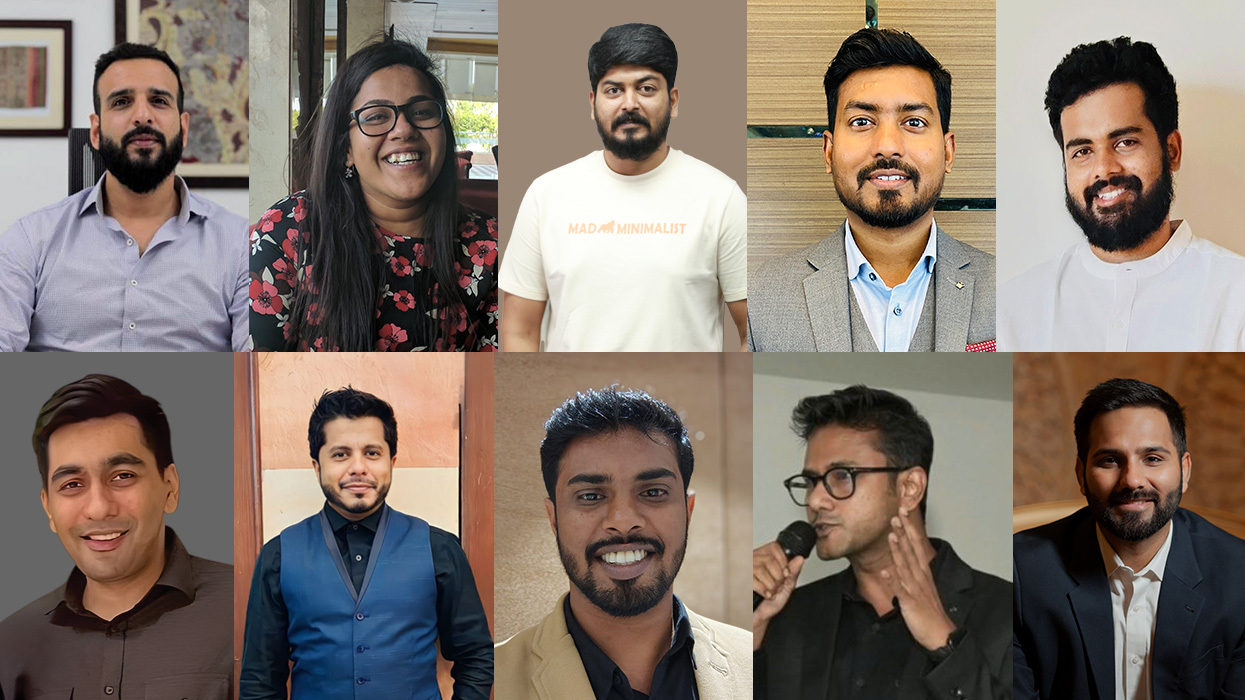
The Everyday Luxury Architect
Sarabjeet Saluja, Founder and CEO, Saundh
Sarabjeet Saluja is the Founder and CEO of Saundh Retail Pvt. Ltd., a mid-premium Indian fashion and lifestyle brand redefining contemporary Indianwear. He began his career at Sahiba Ltd., one of India’s largest textile conglomerates, gaining exposure to both international and domestic fashion markets. Representing Sahiba at trade exhibitions across the Middle East, Europe and North America, he developed a thorough understanding of global fashion cycles, buyer expectations and large-scale sourcing. Concurrently, his work with leading Indian designer brands provided insights into how Indian consumers connect with design, emotion and heritage. His deep expertise in digital printing and embroidery technologies enabled him to envision a brand that merges craftsmanship with modernity, ultimately leading to the creation of Saundh.
Since 2019, under Sarabjeet Saluja’s leadership, Saundh has expanded to 23+ stores across India with a robust digital presence. He successfully transitioned from a B2B textile background to building a strong B2C retail brand, scaling the D2C platform and marketplaces like Myntra and Nykaa Fashion with 2.5x year-on-year growth. By integrating advanced textile techniques and unique surface treatments, he has positioned Saundh as an “everyday luxury 9-to-9” brand, redefining ethnic and fusion wear for modern Indian women. Through its in-house production model, Saundh continues to set benchmarks in quality, sustainability and innovation, while initiatives like Khaas, Rozana and Saundh Imagine highlight the brand’s focus on creativity, storytelling and India’s artisanal heritage.
Saundh has bridged the gap between luxury couture and accessible design, establishing a niche for everyday luxury. Sarabjeet Saluja envisions Saundh as a definitive ‘9-to-9’ everyday luxury brand, offering versatile clothing that transitions effortlessly from workday to evening occasions. Over the next two years, the brand aims to scale aggressively, achieve a Rs. 500 crore topline, and expand internationally, beginning with key fashion hubs.
The Circular Fashion Champion
Sanjana Swaroop, Founder and CEO, EcoDhaga
Armed with legal training from the University of Dundee and the University of Southern California, Sanjana combines global insight with deep local empathy. Recognised among top innovation programmes like EarthON Climate Fellowship, D2CX by Inc.42, Stanford Seed Spark, TechnoServe’s GreenR Boost, IIMB NSRCEL Women Start up Programme and Meta–FICCI’s XROS Fellowship, she has consistently been celebrated as one of India’s most promising young entrepreneurs driving climate-forward change.
What sets Sanjana apart is her conviction that future leaders must also be activists. Her vision for leadership is unapologetically purpose-driven—where success is measured not just by profit, but by progress. As she continues to build bridges between business, governance, and justice, Sanjana Swaroop stands as a powerful reminder that the future of industry lies in compassion, courage, and conscious action.
As the Founder and CEO of EcoDhaga, India’s first women-led textile recovery platform, Sanjana has built a climate-positive, impact-first enterprise advancing circularity in fashion. Bootstrapped from the ground up, EcoDhaga has become a model for responsible entrepreneurship—creating livelihoods for women, diverting textile waste from landfills, and shaping industry dialogue around sustainability and policy.
Her work goes beyond the boardroom. Through her engagement with NavGurukul’s School of Second Chances, Sanjana is designing a livelihood curriculum in textile product development that integrates ESG principles into grassroots education with a focus on upcycling skilling—empowering women from vulnerable communities to participate in India’s sustainable economy. Sanjana’s career reflects an uncommon blend of strategic foresight, legal acumen, and purpose-driven activism.
She is also a member of the Institute of Directors, FICCI FLO and Catalyst for Women Entrepreneurs, and is a regular panelist at national forums on circular economy, textile waste management, and gender equity.
At the heart of Sanjana’s leadership lies a simple conviction: future leaders must also be activists. She believes that true change demands both courage and compassion—traits that define her journey from corporate law to social impact. Looking ahead, Sanjana aims to expand her work at the intersection of business resilience, gender justice, and climate governance, ensuring that companies of tomorrow are not only profitable, but also principled and planet-positive.
The Slow Fashion Custodian
Arun Alagarasan, MD, Eashwar Exports
Arun was born and raised in Tirupur, representing the second generation of a textile family deeply rooted in India’s apparel hub. His journey began by supporting his father’s textile processing business, where he learned the value of hard work and precision from a young age. Growing up inside the unit, he gained hands-on experience across every stage of production — from spinning and yarn to fabric development and finishing. Over time, he explored ready fabric trading, garment manufacturing and exports, acquiring a comprehensive understanding of how every thread connects to purpose.
Out of this experience and passion came a desire to build something meaningful — a brand that respects both the customer and the planet. This vision led to the creation of A&A, built on the philosophy of slow fashion. Using certified organic cotton, A&A celebrates simplicity and quiet luxury.
From this foundation emerged another brand Mad Minimalist – More About Tomorrow, a natural evolution of Arun’s sustainable vision. The brand embraces nature’s untouched beauty through undyed, chemical-free fabrics that reduce environmental impact. Based on production analysis, reaching one lakh pieces will save over 2.4 lakh m³ of water and cut more than 34 tonnes of CO₂ emissions.
The Factory Futurist
Md Jawed Akhtar, Co-founder and CEO, Jaza Software
A graduate of the National Institute of Fashion Technology (NIFT) specializing in Apparel Production, Jawed began his journey in an export house, where he witnessed first-hand how production teams and merchandisers relied on manual, spreadsheet-based processes that caused delays, inefficiencies, and productivity loss. This experience inspired him to conceptualize a digital solution that could simplify, automate, and bring real-time visibility to factory operations.
In 2017, he launched Jaza Software, which has grown from a start-up concept to a trusted technology partner for more than 50 factories across India, Bangladesh, Mauritius, Madagascar, Indonesia, Sri Lanka, Vietnam and Kenya. The company’s clientele includes leading industry names such as Arvind, Pacific Jeans, Vardhman, Indo Count, Ciel Textile, and Gala Group.
Jaza’s flagship products — OptaFloor, a predictive MES platform for production and quality management, and OptaCut, a fabric optimization tool that improves fabric utilization by up to 8% — have redefined how manufacturers monitor performance, reduce waste and enhance productivity. These solutions contribute to sustainability by promoting resource efficiency and paperless operations. Jawed believes that real transformation in manufacturing will come from empowering grassroots and frontline management with intelligent technology.
The Fabric Maestro
Sagar Baheti, Partner, ACC Clothing LLP
As Partner at ACC Clothing LLP — India’s largest organised fabric stockist with over 10,000 SKUs — his focus is on modernising how fabrics are sourced, managed and experienced. Unlike most early online sellers whose catalogs were manually updated and often inaccurate, he helped build a system that delivers live inventory data, rendered visuals and dynamic PDFs in real time.
Transitioning wasn’t easy — staff resistance required years of persistence and training before automation became seamless. Today, cataloging, inventory and dispatch run effortlessly, freeing the team to focus on design, quality and growth. Another core achievement has been tackling one of the industry’s biggest barriers: MOQs. At ACC, he enabled 50-meter MOQs at highly competitive prices, allowing start-ups to test markets and diversify without risking 1,200–2,000 metre commitments. He also led the creation of ACC’s “Program Series” — a curated collection of over 100 core and never-out-of-stock fabrics that drive consistent business for hundreds of brands across India.
He is now building a next-generation platform with advanced UI/UX, mood boarding, storytelling and visual intelligence tools to make fabric sourcing truly experiential.
The RFID Pioneer
Aditya Biyani, Chief RFID Enabler, TagID Solutions Pvt. Ltd.
Aditya’s professional journey spans a diverse range of experiences, starting from interning as an Investment Banker at HSBC to directly engaging with Kirana store owners in 2015- 16, convincing them to stock new products like Chinese sauces from Capital Foods—a relatively novel category at the time. These early experiences instilled in him the importance of persistence, turning repeated “no’s” into eventual “yes’s,” and taught him that selling is not just a profession but a fundamental life skill. Later, at Nippon Mutual Fund, Aditya deepened his understanding of financial statements and gained insights into business operations across the small-cap to large-cap spectrum, building a 360° perspective of how companies and their P&Ls function.
Leveraging this foundation, Aditya took the entrepreneurial leap and founded TagID Solutions, India’s first and largest integrated RFID manufacturing and software solutions provider. Under his leadership, the company scaled production capacity from 60 million to 400 million RFID tags per annum within four years and has cumulatively dispatched over 800 million RFID tags since inception. He has been instrumental in driving technologyled transformation across the retail sector, enabling RFID adoption in over 300 stores and serving global brands like Sheridan and Walmart in non-apparel categories. TagID Solutions has also powered more than 2,000 stores in India to adopt RFID-based billing, significantly enhancing consumer experience.
Aditya pioneered India’s first SMART warehouse, enabling GRN/inwards processes without manpower, achieving 10x throughput and implementing RFIDbased bulk checkouts and stock takes 16x faster without warehouse shutdowns. He has collaborated with over 20 factories to enhance shipment transparency, ensure supplier compliance and achieve ‘perfect shipments’ through case-level auditing. Looking ahead, Aditya envisions leveraging AI and predictive technologies to drive large-scale automation and improve unit economics. He aims to localize and scale RFID technology across the value chain, from textiles to ready-made garments, integrating tags to enhance throughput, minimize manual bottlenecks and trace productivity, ensuring accurate and efficient operations across the industry.
The Productivity Catalyst
Sharjeel Ahmed CEO, Pazo
A tech enthusiast from a young age, Sharjeel wrote his first lines of code at 12 and developed the Karnataka CET website in 11th grade, marking his early entry into solving real-world problems through technology.
After working with leading technology companies such as Adobe and Microsoft, Sharjeel decided to pursue his passion for building products that address operational challenges, leaving Microsoft to start Pazo, a mobile-first SaaS platform transforming execution in the Retail and Facilities Management industry. At Pazo, he and his team identified gaps in on-ground execution, visual merchandising, and planogram compliance. The platform enables enterprises to digitize daily operations, with AI-driven validation ensuring every store meets brand standards. To date, over 70 million checklists have been completed on Pazo, with AI confirming compliance in real time.
Sharjeel’s work has earned global recognition, with backing from Techstars, Metro Cash & Carry Germany and the Government of Karnataka. Pazo has also received accolades including the NASSCOM Emerge 50 (League of 10) Award, the Dell Startup Challenge, and a Microsoft Case Study feature. Looking forward, Sharjeel aims to build a new generation of AI agents that eliminate repetitive paperwork, enabling retail workforces to focus on improving customer experience and driving sales, making AI an intelligent collaborator that transforms frontline operations across industries.
The Start-up Fashion Builder
Manuraj Sureshbabu, Co-founder and CFO, Varthagam International
Manuraj’s entrepreneurial journey began in 2018, when the company was initially formed to fulfill the apparel needs of college teams. After successfully delivering solutions for over 100 teams, he and his Co-founders realized that their expertise could be leveraged to support startup brand owners in apparel production and brand launches. In 2019, Varthagam International was established as a dedicated manufacturing company catering to the apparel requirements of startup brands, offering a wide range of cotton varieties with some of the most competitive minimum order quantities in the market. Starting with a turnover of Rs. 1 lakh in 2018, the company is on track to achieve Rs. 20 crore in the 2025–26 financial year.
Manuraj’s leadership has been recognized through various platforms. He was invited as Chief Guest at Sri Krishna College of Arts and Science, serving as a jury member to assess the best business ideas. He also served as Vice-President in the business networking forum BNI from April to October 2024 and participated as a speaker at the 4th Edition of Apparel Sourcing Week 2024 on the topic of “Sustainability Check – Are Alternative Materials Walking the Talk.” Under his guidance, Varthagam International has expanded its manufacturing scope beyond knitwear to include woven products like shirts and towels, creating a wider impact across the textile sector. Looking ahead, Manuraj aims to establish Varthagam International as a renowned manufacturing brand for high-quality knitwear products and aspires to expand its presence internationally, transforming the company into a multinational textile manufacturing enterprise.
India’s Textile Printing Game-Changer
Deepak Siddharth K, Founder and CEO, RDX
From a software engineer to a visionary entrepreneur transforming India’s textile landscape, Deepak Siddharth K’s journey has been guided by one belief: technology, when fuelled by purpose and persistence, can reshape industries.
He began his career as an e-commerce developer at TCS and Cognizant, where he learned the power of technology to simplify complexity and scale ideas. In 2012, he took the entrepreneurial leap and founded Rajdeep Clothing Company, launching Tshirtloot.com, one of India’s earliest custom T-shirt printing platforms. What began as a small step into apparel digital printing soon became a turning point in his life. He witnessed firsthand the immense potential of digital printing and its limitations. Imported machines dominated the market, often expensive to maintain and poorly supported, restricting the growth of Indian printers which had the creativity but not the tools to match it.
Determined to change that, he spent the next decade building one of India’s largest custom T-shirt printing businesses, becoming an advocate for the future of digital printing. Through continuous learning and innovation, he worked to educate the market about its many advantages—faster sampling, shorter runs, print-on-demand flexibility and sustainability. Yet a question continued to drive him: Why should India, with its deep textile heritage and engineering talent, depend on foreign technology? That question sparked the birth of RDX Digital Technologies in 2022 with a bold mission to engineer and manufacture high-speed hybrid digital textile printing machines proudly made in India. Within months of its inception, RDX redefined what was once considered impossible, becoming India’s first company to design and build such advanced hybrid digital textile printers.
Today, RDX machines are setting new benchmarks in print quality, reliability and cost efficiency, empowering textile manufacturers across India and beyond. With over 30+ installations nationwide and a rapidly expanding presence in Bangladesh and other textile manufacturing markets, RDX continues to strengthen India’s position on the global textile technology map—saving valuable foreign exchange and restoring confidence in India’s ability to create world-class technology from the ground up.
But RDX is more than a machine manufacturer; it’s a movement to redefine the future of textile printing through engineering, AI and imagination. The company launched ardix. ai, an AI-powered image generation and print-on-demand platform, allowing anyone— from students to professional designers—to bring ideas to life instantly. In collaboration with NIFT Bengaluru (Ministry of Textiles), RDX is exploring how AI can enhance productivity and empower designers to create intricate patterns quickly and sustainably. Through RDX, Deepak aspires to bridge India’s rich textile legacy with tomorrow’s intelligent technology. The journey is not just about machines; it’s about redefining what Indian innovation stands for, empowering creators and inspiring the next generation to dream audaciously, build fearlessly and prove that “Made in India” can indeed mean “Made for the World.”
India’s Compliance Visionary
Kunal Shingala COO and Director, Testtex India Laboratories Pvt. Ltd
In an industry where compliance and innovation often move on parallel tracks, Kunal Shingala has been steadily bridging that gap with purpose and precision. He has transformed the organisation from a domestic testing facility into a modern, multi-domain laboratory recognised for its credibility, reliability and technical excellence across India and overseas.
Under his guidance, Testtex has expanded its laboratory footprint across India, diversifying into Consumer Product Services (CPS) and Food & Water testing, while significantly increasing headcount and technical capability. The company has also extended its global presence with the launch of Testtex CPS for the MENA region, marking its first international foray and strengthening its role.
Kunal’s vision for Testtex goes beyond testing. He aims to position it as a market knowledge centre: a trusted space where compliance expertise meets industry insight. By translating testing data into actionable intelligence and sharing learnings across sectors, Testtex is helping manufacturers understand and implement global quality standards more effectively.

